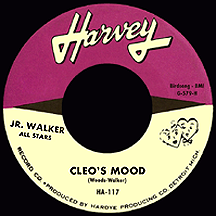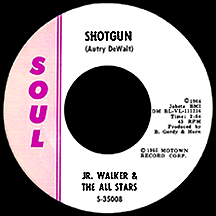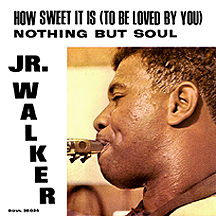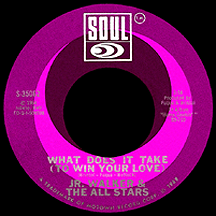JR. WALKER AND
THE ALL STARS
Hitsville U.S.A. was a great place to be in the 1960s. Detroit's headquarters for the influential group of labels including Tamla, Motown, Gordy, V.I.P., Soul and others worked under Berry Gordy's highly structured and disciplined model for writing and producing records, which included a weekly music meeting to determine which songs had the potential to become hit singles. Of the many artists the label handled in those years, about a dozen achieved long-lasting success, and of this elite group, just one act worked the edges of the Motown system, with a rougher image than the refined standard Gordy aspired to and insisted on. These purveyors of old-school rhythm were Jr. Walker and the All Stars.
Oscar Mixon was older than most of the Motown performers, his musical tastes reflecting an earlier era. Born in 1931 in Blytheville, Arkansas, he was influenced during his South Bend, Indiana childhood by blues singers and jazz combos, artists that included Louis Jordan and wailin' sax blowers like Illinois Jacquet, Big Jay McNeely and Earl Bostic, not quite the combination you'd expect to factor into Gordy's trendsetting soul movement of the 1960s. Changing his name to Autry DeWalt II, he put his own group together around 1954 called The Jumping Jacks, but before long had joined another outfit, The Rhythm Rockers, headed by drummer Billy "Stix" Nicks with keyboard player Fred Patton and singer/guitarist Willie Woods. Before long the group's sound revolved around DeWalt's squealing sax breaks. Nicks was drafted by the Army and replaced on drums by Tony Washington, but would return to the lineup in the mid-'60s. For the next few years the band performed mostly in the Battle Creek, Michigan area. Positive crowd reaction and more bookings than there were days in a week clearly convinced them of their local star status, and by the early-'60s the group's name had been changed to The All Stars.
In 1961, Johnny Bristol dropped in at an All Stars gig and recommended them to Harvey Fuqua, former lead singer of The Moonglows. Johnny was recording with Jackey Beavers at that time as Johnny and Jackey for Fuqua's Detroit label, Tri-Phi Records. DeWalt's sax playing had been causing quite a sensation with clubgoers, so Harvey suggested a slightly different name for the group, and suddenly Oscar Mixon, who'd become known as Autry DeWalt, had a new stage handle, Junior Walker. The band's three singles released on Tri-Phi sibling label Harvey in 1962 and '63 were credited to Jr. Walker All Stars, strong jazz/R&B tracks with an emphasis on DeWalt's gutbucket saxophone solos. One of these, "Cleo's Mood," a shuffling, midtempo number with a massive sax sound, had a brief impact in the Detroit area.
Gordy had bought out several smaller Detroit record labels by 1964, including Tri-Phi and Harvey, as well as the Anna label (founded by his sister Anna Gordy), in many cases hiring owners and staff members for positions in A&R or record production. The All Stars were among the many artists Gordy acquired, and though they didn't fit the standard Motown sound or image, he gave them a shot. A "Shotgun" blast, in fact, for that early 1965 single, their second release on the new Soul Records imprint, with its explosive opening gun-blast, hit the national top five and number one on the R&B charts. Junior (credited with the abbreviation Jr. on all releases) handled vocal duties, shouting 'we're gonna dig potatoes, we're gonna pick tomatoes' with a heavy organ backing and his own raucous sax breaks. A killer party single and a Grammy nominee for Best Rhythm and Blues Recording to boot.
The next few years brought a steady stream of hits for the group, including the instrumental jam "Cleo's Back" in late '65, followed a few months later by the original "Cleo's Mood," a hit at last in rerelease. While many Motown acts had one producer or producing team guiding them, everyone at the label took a turn with Walker's group: Bristol and Fuqua, Eddie Holland, Lamont Dozier and Brian Holland, William "Mickey" Stevenson, Henry Cosby, Lawrence Horn and even Berry Gordy himself. All Stars hits from '66 through '68 included "(I'm A) Road Runner," "Pucker Up Buttercup," "Shoot Your Shot" and "Hip City," vocal tunes heavy on Junior's instrumental sax runs, in addition to Walker-ized versions of previous Hitsville smashes, Marvin Gaye's "How Sweet it Is (To Be Loved By You)," Barrett Strong's "Money" and The Supremes' chart-topper "Come See About Me."
Junior got a lot of mileage out of his attention-getting sax-slingin' and was the only artist of the 1960s to build a lengthy string of hits employing a style more in step with the jazz, R&B and rock of the previous two decades. In search of another chart-topping smash, he allowed Harvey Fuqua and Johnny Bristol to guide him into a more romantic territory closer to the established Motown style, with "What Does it Take (To Win Your Love)" in the spring of 1969. It turned out to be his biggest hit, putting him back in the top five, number one on the R&B (by that time Soul) charts and landing Junior and the All Stars a second Grammy nomination, though NARAS inexplicably put the vocal recording into the Best Rhythm and Blues Instrumental Performance category, a deviation we've seen from them too often through the years.
Jr. Walker and the All Stars enjoyed a resurgence starting with "What Does it Take," covering "These Eyes" and taking it top 20 just a few months after The Guess Who's original. Several more hits took them into the next decade, with the jazzy "Walk in the Night" the last to score for the group in 1972. Junior once again found himself at the forefront of the music scene in 1981, supplying the hot, screeching sax solo in Foreigner's top five smash "Urgent."
NOTABLE SINGLES:
- Twist Lackawanna - 1962
as Jr. Walker All Stars - Cleo's Mood - 1962
as Jr. Walker All Stars - Brainwasher - Part 2 - 1963
as Jr. Walker All Stars - Monkey Jump - 1964
- Shotgun - 1965
- Do the Boomerang - 1965
- Shake and Fingerpop /
Cleo's Back - 1965 - (I'm A) Road Runner - 1966
- How Sweet it Is (To Be Loved By You) - 1966
- Money (That's What I Want) - 1966
- Pucker Up Buttercup - 1967
- Shoot Your Shot - 1967
- Come See About Me - 1967
- Hip City - Part 2 - 1968
- Home Cookin - 1969
- What Does it Take (To Win Your Love) - 1969
- These Eyes - 1969
- Gotta Hold On to This Feeling - 1970
- Do You See My Love (For You Growing) - 1970
- Take Me Girl, I'm Ready - 1971
- Way Back Home - 1971
- Walk in the Night - 1972





